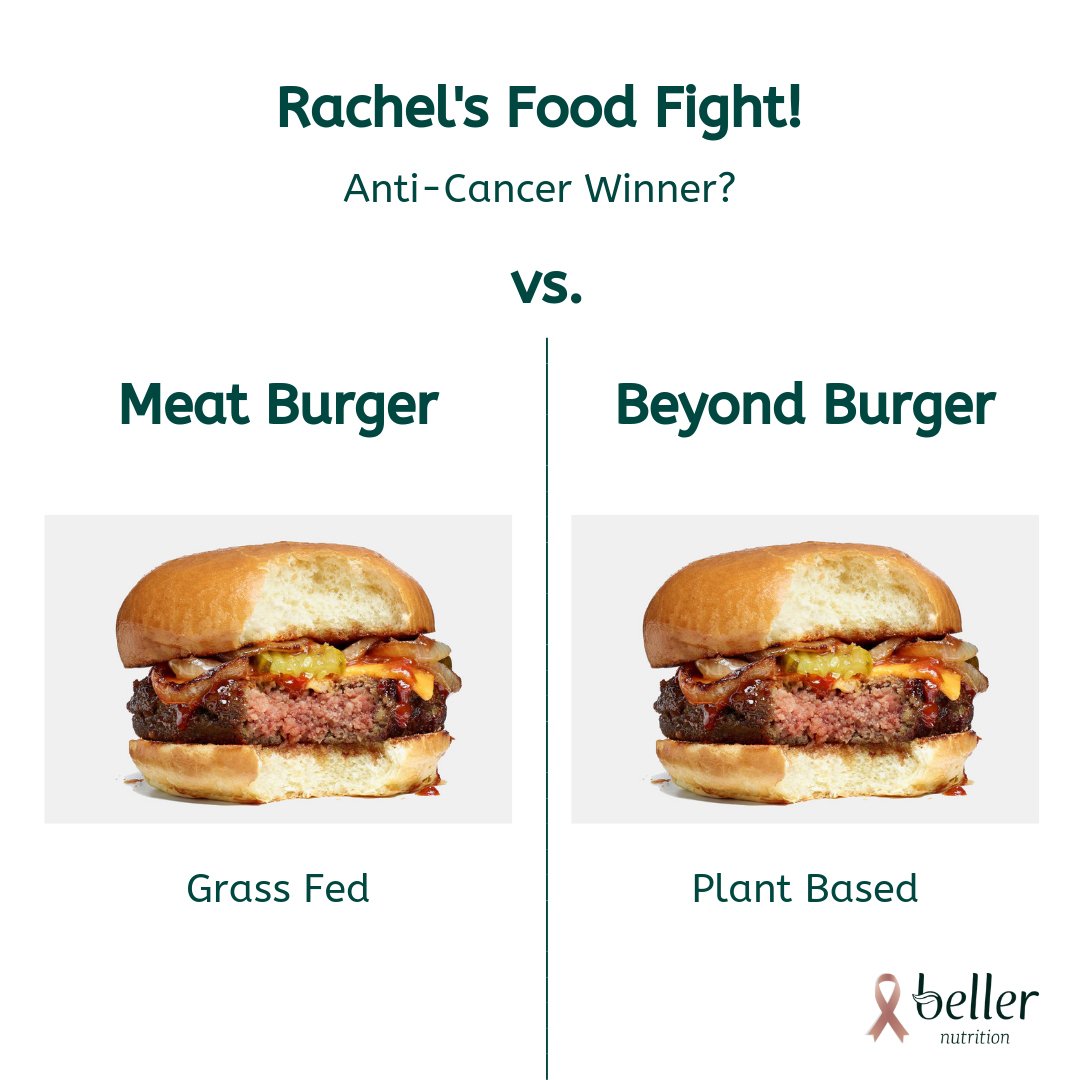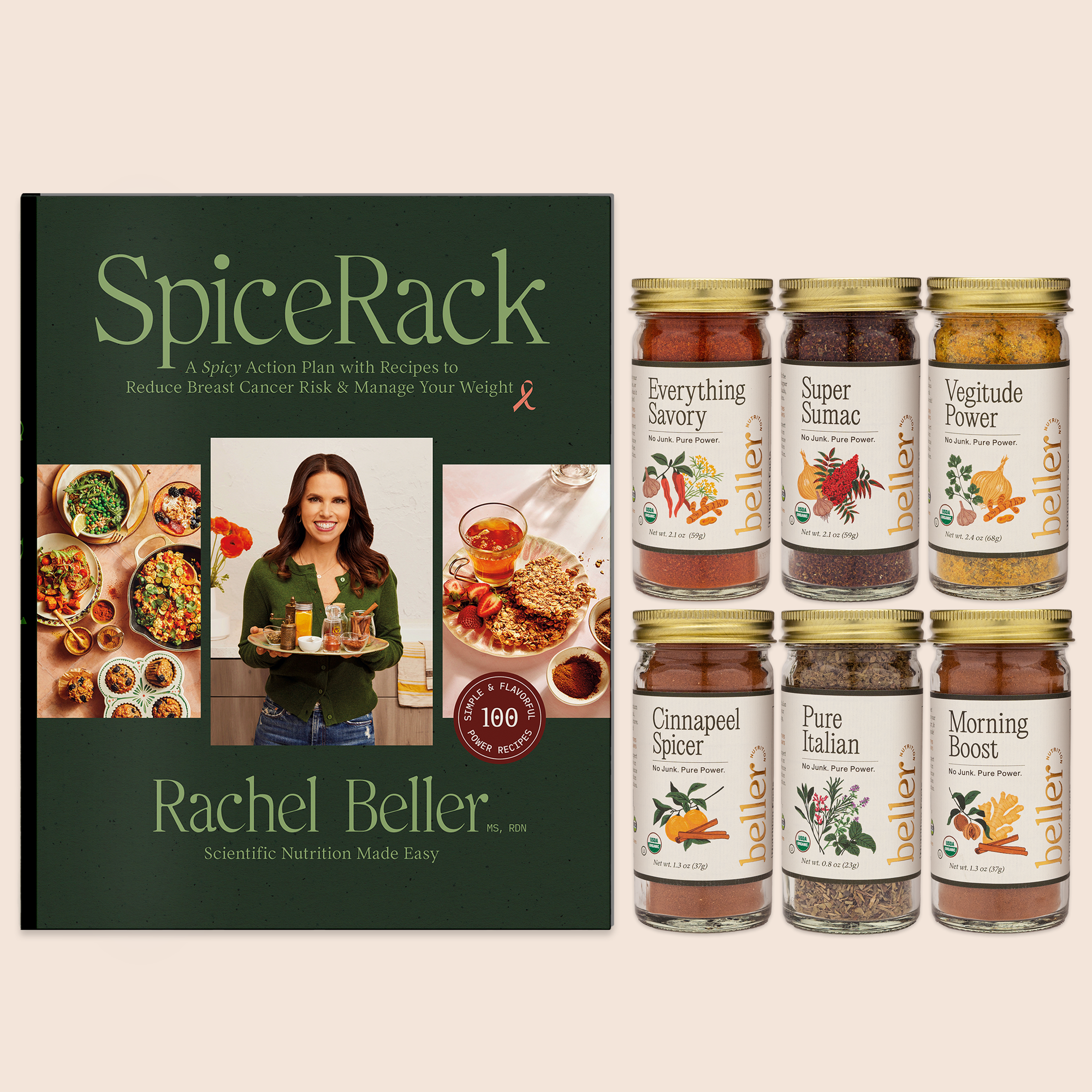Which burger is safer for breast cancer prevention?

Food Fight | Beef vs Veggie burger: does it make a difference to your breast health? Choosing the best burger option this summer
Before you buy your next burger ingredients this summer, I want you to stop and think about what choices are going to be safest for your breast health. With more “meatless” and plant based burgers available than ever before, some choices are better than others. It can make a huge difference to your health.
Today I’m breaking down the pros and cons of burgers made from ground beef vs the plant-based Beyond Burger made from pea protein. Here’s what you need to know before you eat your next burger.
Round 1- Burger Ingredients
What’s in your favorite meat and veggie burgers?
Some people argue that meat is less processed than these plant-based products but what’s really in both of these burgers?
Meat burger
Ground beef comes from several parts of the cow including chuck, rib, loin, sirloin, round, shank, flank, plate, and brisket. It could also be labeled as ground chuck, ground round, ground sirloin or ground steak. A beef patty is made from ground muscle and it contains fat.
Beyond Burger
There’s no way around it; non-meat burgers are going to have more ingredients as they attempt to mimic the texture and flavor of ground beef. Ingredient list:
Water, pea protein isolate, expeller-pressed canola oil, refined coconut oil, rice protein, natural flavors, cocoa butter, mung bean protein, methylcellulose, potato starch, apple extract, salt, potassium chloride, vinegar, lemon juice concentrate, sunflower lecithin, pomegranate fruit powder, beet juice extract
Round 1 winner?
Though Beyond Burger contains more ingredients, it has more fiber (meat has none) and no IGF-1 (meat is a natural source of this hormone). IGF-1 plays a key role in breast cancer development, progression and metastasis. Beyond burger wins.
Round 2 – Protein Content
One of the benefits of eating any burger is the protein it contains. Here’s how these two stack up:
Meat Burger
A standard 3-ounce burger patty contains 21 grams of protein.
Beyond Burger
This plant-based patty has 20 grams of protein.
Round 2 winner?
It’s a tie! The protein content is about the same. This isn’t the case for all plant-based burger alternatives so make sure to read labels before choosing your next vegetarian burger. If you choose Beyond Burger, you’re good to go.
Round 3 – Fat content
For breast health, there’s a limit to how much fat should be in your diet.
Meat Burger
Ground beef is a generally high fat product. The standard fat in ground beef is 20 percent though there are lean varieties available ranging from 90-95% lean. A 3-ounce burger will contain 215 calories, 14 grams of fat (5 grams saturated).
Beyond Burger
The plant-based option is 250 calories with 18 grams of fat (6 grams saturated fat). The saturated fat from this veggie burger comes from coconut and cocoa butter to get the mouth-feel of meat making it more “burger-like”.
Round 3 winner?
The American Heart Association recommends making sure that saturated fat is only 5-6% of your daily calories. If you eat about 2,000 calories a day, no more than 120 should come from saturated fat which is about 13 grams per day. A 3-ounce meat burger exceeds that but so does the Beyond Burger. It’s another tie.
Lighting Round
A quick snapshot of some other considerations when comparing these foods
Sodium
Meat: 57 mg
Beyond: 390 mg
Environment
Meat: traditional factory farming has links to deforestation, pollution, and greenhouse gas emissions.
Beyond: evidence supports that it’s much more environmentally sustainable to grow beans vs beef.
Taste
Meat: many of us grew up eating beef burgers so this is a familiar comfort food.
Beyond: plant-based burgers use a variety of ingredients to mimic the flavor and texture of beef. Personally, I love the taste of Beyond and other non-meat burgers.
Fiber
Meat: zero
Beyond: 2 grams
Food Safety
Meat: Ground beef has a large surface area, making it a higher food-borne illness risk which is one reason that it’s important to temp your meat burgers to 160 degrees – especially if you have any type of immune compromise during or post cancer treatment.
Beyond: these are perishable and need to be used within 3 days of opening the package. Cook until the internal temperature is 165 degrees.
The Final Verdict
Based on guidelines for breast cancer, the plant-based burger is the winner here. Though about equal in protein and fat, growth hormone and fiber content make it impossible for me to recommend a grass fed organic beef burger over a plant-based one for your health. Meat wins on being lower in sodium although most people do add salt while cooking. I think that the taste of the Beyond Burger is very comparable.
You need vitamins, minerals and antioxidant in addition to a high fiber diet for breast health. Saturated fat and IGF-1 should be limited. Does that mean you can’t ever have a burger again? No – that’s not what I’m saying. But if you have a choice, or the next time you’re grocery shopping, choose the plant-based burger.
Sources:
Christopoulos PF, Msaouel P, Koutsilieris M. The role of the insulin-like growth factor-1 system in breast cancer. Molecular cancer. 2015;14(1):43.
https://www.cancer.org/latest-news/choosing-healthy-fats.html
https://www.cnet.com/news/beyond-meat-vs-impossible-burger-whats-the-difference/
https://www.beyondmeat.com/products/the-beyond-burger/
https://www.beefitswhatsfordinner.com/cuts/cut/2486/ground-beef
https://static.ewg.org/reports/2011/meateaters/pdf/report_ewg_meat_eaters_guide_to_healt
h_and_climate_2011.pdf
Springmann M, Wiebe K, Mason-D’Croz D, Sulser TB, Rayner M, Scarborough P. Health and nutritional aspects of sustainable diet strategies and their association with environmental impacts: a global modelling analysis with country-level detail. The Lancet Planetary Health. 2018;2(10):e451-61.
Nelson ME, Hamm MW, Hu FB, Abrams SA, Griffin TS. Alignment of healthy dietary patterns and environmental sustainability: a systematic review. Advances in Nutrition. 2016;7(6):1005-25.

